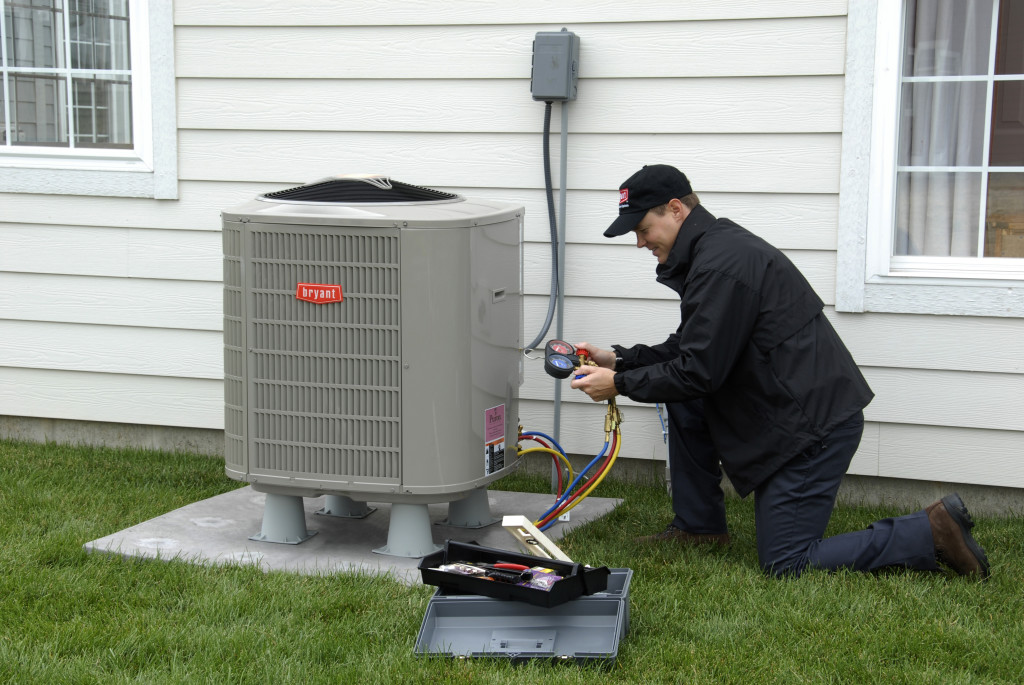When people inquire about the sort of power source their air conditioner (AC) uses to chill their house or place of business, they typically mean to know if it runs on gas or electricity. The short answer is that while some systems may have gas heating components, the majority of air conditioners run on electricity. Experts at https://www.airconservicing.org/pricing/ can resolve any AC issue no matter what kind of AC you have Let’s take a closer look at this subject to learn more about the many types of air conditioning systems, the fuels they operate on, and how this affects energy usage.
Air Conditioning Powered by Electricity:
Electricity powers the great majority of air conditioning systems. This covers ductless mini-split systems, window units, portable air conditioners, and central air conditioning systems. The different parts that enable the cooling process are powered by electricity and include:
- Compressor: The compressor is the engine of the air conditioner. It moves refrigerant from the indoor to the outdoor units, absorbing heat inside your house and releasing it outdoors.
- Fan: Fans cool your home by moving air across the evaporator coil and let heat escape through the condenser coil outside.
- Condenser and Evaporator Coils: These coils transmit heat and are a component of the refrigeration cycle.
- Thermostat: The thermostat sets the temperature according to your preferred degree of comfort by communicating with the system.
Gas-Powered Air Conditioning:
Certain HVAC systems use gas for heating, even though gas isn’t normally used to power the air conditioning process itself. We refer to these as “dual-fuel” systems. A dual-fuel system combines a gas furnace with an electricity-powered heat pump. The heat pump uses electricity to heat the house in the winter, but when the temperature drops too low, it converts to gas heat, which is more efficient in colder weather.
However, areas with significantly longer summers than winters or where households only use electricity for heating and cooling are not typical locations for this kind of system. In colder climates, gas furnaces are more frequently utilized.
A Look at Energy Efficiency:
Making more energy-efficient decisions can also be aided by knowing whether your air conditioner is gas- or electricity-powered. Here are some things to think about:
- Electric Air Conditioning Systems: Modern, high-SEER (Seasonal Energy Efficiency Ratio) types of electric air conditioners can be quite efficient. Over time, your power rates may decrease since a system with a higher SEER rating uses less electricity to cool your home.
- Dual-Fuel Systems: Because they automatically convert between gas and electric heating based on the outside temperature, these can be more energy-efficient in areas with large seasonal temperature changes. This method maximizes energy savings and comfort.
- Maintenance: Whether your system heats with gas or electricity, keeping it operating efficiently depends on routine maintenance. Energy waste can be avoided by maintaining clean air filters, monitoring refrigerant levels, and examining the compressor and other parts. Have your AC maintained by a professional from https://www.airconservicing.org/ for optimal performance.
Which of the Systems Fits You Best?
A number of things should be taken into account when choosing between an all-electric air conditioning system and a dual-fuel system that runs on both gas and electricity:
- Climate: To maintain optimal heating efficiency, a dual-fuel system can be a preferable choice if you reside in a place with harsh winters and mild summers. However, electric systems are usually more than sufficient in warmer climates when cooling is the main concern.
- Energy Costs: The price of gas and electricity in your community may have an impact on your decision. In certain areas, natural gas could be less expensive than electricity, particularly during the winter when there is a greater need for heating.
- Environmental Impact: It’s important to think about how your local power grid produces electricity if environmental sustainability is a concern for you. Since many grids rely on renewable energy sources like solar and wind, all-electric systems are more environmentally friendly than gas-powered systems.







